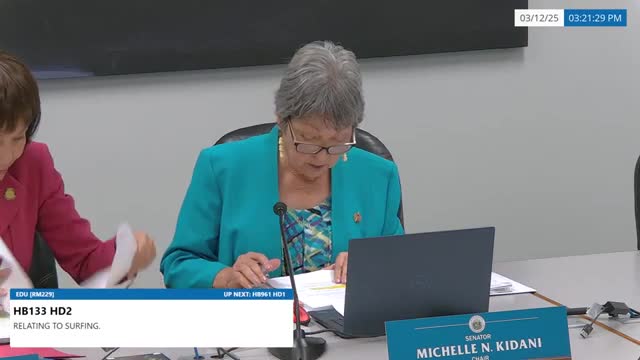Hawaii Senate Committee endorses House Bill 133 for interscholastic surfing program
March 13, 2025 | Senate Committee on Education, Senate, Legislative , Hawaii
Thanks to Scribe from Workplace AI , all articles about Hawaii are free for you to enjoy throughout 2025!

This article was created by AI using a video recording of the meeting. It summarizes the key points discussed, but for full details and context, please refer to the video of the full meeting. Link to Full Meeting
The proposal, known as House Bill 133, aims to allocate funds to the Department of Education to support this initiative. Terry Ushijima, assistant superintendent of the Office of Curriculum Instruction Design, affirmed the department's backing, noting that surfing has already been recognized by board policy. However, he emphasized that the decision to endorse surfing as a sport would ultimately rest with individual leagues.
Keith Amemiya, chair of the Governor's Sports Task Force, passionately advocated for the bill, highlighting the overwhelming support it has garnered. He pointed out that there was no opposition to the proposal, with concerns raised primarily about costs, safety, and varying levels of support from school principals. Amemiya reassured the committee that funding would alleviate financial burdens and cited the successful safety record of the Maui Interscholastic League, which has hosted surfing competitions for over a decade without serious incidents.
Among the voices advocating for surfing was Beth Matsuda, a dedicated teacher from Makaha, who has tirelessly worked to bring surfing into schools. She shared her experiences and the growing interest in the sport, noting that participation has expanded significantly over the years. However, she also highlighted the financial challenges faced by schools, as many have been funding surfing programs out of pocket.
Kylie Sato, captain of the Lailihua High School surf team, expressed the desire for official recognition, stating that being classified as an official sport would enhance opportunities for students and promote ocean safety. Her testimony resonated with the committee, emphasizing the cultural significance of surfing in Hawaii and its potential to foster a sense of community and responsibility among young athletes.
Kim Ball, representing the Maui Interscholastic League, reinforced the safety and success of existing surfing programs, while Christopher Sanita, principal of Hana High and Elementary School, underscored the cultural and economic importance of surfing in Hawaii. He articulated how the sport is woven into the fabric of Hawaiian identity, serving not only as recreation but also as a vital economic driver through tourism.
As the meeting concluded, the committee members were left with a sense of the profound impact that recognizing surfing as an official sport could have on students, schools, and the broader community. The discussions illuminated not just the potential for athletic development, but also the opportunity to celebrate and preserve Hawaii's rich cultural heritage through the sport of surfing. The future of House Bill 133 now rests in the hands of lawmakers, with advocates hopeful for a positive outcome that honors both tradition and the aspirations of Hawaii's youth.
Converted from EDU Public Hearing 03-12-2025 meeting on March 13, 2025
Link to Full Meeting
Comments
View full meeting
This article is based on a recent meeting—watch the full video and explore the complete transcript for deeper insights into the discussion.
View full meeting